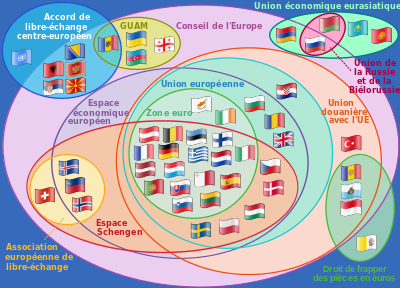|
| Europe : main issues and achievements (#6) |
(Like Europe, this page is under construction ...) |
|
|
|
 |
| Some of the main issues for Europe |
|
Its major achievements |
-
What do we have in common ? For most Europeans, the first reaction when they put their foot in another Western country like the USA, Canada or Australia is to say "I don't know why, but I feel European". What makes the European identity ? Our history ? Our common cultural and religious roots ? Our common interests and which ones?
-
What kind of relation with neighboring countries? Around Europe, several important countries maintain close relations with Europe but, culturally and historically, cannot be considered European : Turkey, Ukraine or Morocco and also Armenia or Georgia. Most Europeans feel clearly that these countries are not really "foreign" but that they are not really "us".
-
How far can we go in transferring our national powers to a supranational entity? What is the long-term project ? Since the very beginning of the construction of Europe (1957), the choice is between two long-term visions : a large free-trade one or a united political entity. To make things simple : the constant policy of UK (and of the US) has always been the first one and the dream of the six founding countries (France, Germany, Italy, Belgium, Netherlands and Luxembourg) is still the second one.
-
Why does Europe seem unable to regulate the growing flow of immigrants from the Middle East and Africa and help their integration in European countries ? This issue is one of the major cause of the development of populist parties everywhere in Europe and in the government of some countries (Germany, Italy, Poland and Hungary to name a few).
-
And of course the Brexit : read more
|
|
-
Peace in Europe : after 4 major wars in only 70 years (Germany-Austria 1866, Germany-France 1870, WW1 1914, WW2 1939) the continent has been in peace since 1945, in spite of the Cold War and a few local conflicts (Yugoslavia, Ukraine). Contrary to the situation in the past, the risk of a war between Germany and France or Germany and UK is now zero. This is a huge achievement and the building of the European Union, though difficult, made it irreversible.
-
A better mutual understanding : a large part of the crisis and the wars of the past was due to ignorance of the other peoples and the other cultures. |
 |
- Particularly for young people : the Erasmus program created a new European generation which has nothing in common with its parents' regarding its vision of the other European peoples.
-
An undisputable economic success : free-trade and the elimination of customs and legal constraints have led to a successful and integrated European economy (ask our British friends about how difficult it is to leave the EU now...).
DID YOU KNOW THAT .....? The reunification of Germany in 1990 is, of course, a major event in the history of Germany after more than forty years of two separate states, one democratic and one communist. It was the historical role of Chancelor Helmut Kohl to achieve this reunification in spite of the enormous cost involved. It was also the historical role of President François Mitterrand of France to make it possible by not opposing it in spite of the terrible past of France in front of a strong and more populated Germany. |
| History and histories |
|
What are we learning from the current crisis ? |
If you are American, you had History courses at school. You learned many things about the US : the pilgrims, George Washington and Thomas Jefferson, the Revolutionary War, the victory of freedom fighters and the US Constitution, the Manifest Destiny and the “Go West Young Man” motto, the Civil War and Abraham Lincoln, the Robber Barons and the global triumph of US technology and US corporations, the American Dream, the victory in the two World Wars.
Whether you love History or you do not care much about it, you remember a little bit of these stories and you remember a few things which are part of your identity : America is young, with a glorious history admired by the whole world, America is strong and is a leader in technology, business and popular culture, everybody in the world envies us and dreams of coming here. You share this feeling with most of your fellow Americans : that is your common history and it is one the major elements of the strength of the country.
In France, we too have a common History that we share : we are the descendents of the Gauls and, like them, we like enjoying life but we also love to fight and we are valiant warriors : unfortunately, less civilized people keep attacking us, the English who are boring shopkeepers, the Germans who are brutes, to name a few, we lose battles but we always finish as winners anyway, our kings brought us a well-deserved glory that makes the world envious like The Sun King, Napoleon for example, etc… French historians call it the “Roman National” (read about the the French national saga) and it is part of our common culture.
|
|
(This is a personal opinion, probably largely shared in France and in Germany)
-
Complexity : Europe is too complex (see opposite char)
-
The extension of Europe to much less economically advanced countries (such as Romania and Bulgaria), to countries who do not share the same long term vision (like UK) or geopolitical priorities (the Eastern members) was probably a mistake
-
The Brexit tomfoolery has drawn together the 27 other nations.
-
The Euro is certainly a great project but it demands an integration of national policies that has not been reached (at least yet)
-
The migration flow toward Europe creates economic and cultural fears that cannot be underestimated
-
NATO is indispensable to Europe but illustrates the weaknesses of the European defence policy
|
The problem in Europe, is that we, the twenty-seven countries, have 27 different Roman Nationals, always contradictory. For the Italians and for the Spaniards, the brutes are the French, for the Germans or the British, the dangerous ones are the French, for the Irish, the British are the former colons, etc. For the European Union, improving the mutual knowledge of the members and the convergence of their historical culture is a key-issue.
Europe was created to put an end to European wars and to avoid the surges of nationalism but education in general and education in history belongs to the sovereignty of each country. Recently (2020), the Conseil de l’Europe, an intergovernmental organization founded in 1949 among 47 countries (including Russia and Turkey) has created an Observatoire de l’Enseignement de l’Histoire en Europe to help to “build new Europeans”, as wished by the illustrious medieval Polish historian Bronislaw Geremek. |
|
 |
| |
|
European multilateral treaties and organizations : this chart illustrates how complex Europe is (credit) |
| |
|
|
| To related pages : more facts on Europe (#1), building(#2), European institutions (#3), European facts & figures (#4), Brexit (#5), etc. |
|
To table
of contents
To top
of the page
Back to home
page
|
Harriet Welty
Rochefort writes articles and books about France and the French.
Order her books :
- "Joie de Vivre", Secrets of Wining, Dining and Romancing like the French, St.Martin's Press, New York, 2012
- "French Toast, An American in Paris
Celebrates The Maddening Mysteries of the French", St.Martin's Press,
New York, 1999
- "French Fried, The Culinary Capers
of An American in Paris", St.Martin's Press, New York, 2001
More on Harriet's books (excerpts, upcoming
events, testimonials, etc..)
|
| To
email
me |
If you like this site, please bookmark it or create
a link! |
|